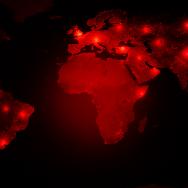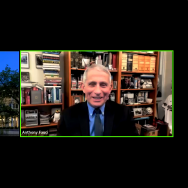Since the COVID-19 virus was discovered, the world has waited for a vaccine that would help our lives return to some level of normalcy. Now that vaccine distribution has begun, what will this “new normal” look like?
In “Life After the Vaccine,” from the producers of the Big Brains podcast, University of Chicago experts explore what the vaccine rollout has revealed about our cities, and how it will impact our lives within them—from our health care systems and businesses, to our educational and cultural institutions.
Learn more about the topics and read the video transcripts below:
- Our civic duty to keep each other safe
- How vaccine passports could help businesses reopen
- Why health care must change to protect marginalized communities
- Leveraging data to direct public health efforts
- Tailoring education to students’ evolving needs
- Reimagining the work of cultural institutions
Our civic duty to keep each other safe
Laurie Zoloth, the Margaret E. Burton Professor of Religion and Ethics at the Divinity School
“So the vaccine is a complex gift. It both gives you a sense that you are protected, but it ought not give you a sense that you’re free to do anything you want. The fact that you have the vaccine means that you’ve accepted the gift, and the gift comes with some strings attached.
It’s a privilege to live in the city, but it’s a kind of privilege that carries with it a deep responsibility, a duty that’s incumbent on each of us to make the city safe.
The nature of this pandemic is such that your personal choice affects the public realm. So when you say: ‘I’m not going to get a vaccine, but I want the right to continue to work. I want the right to get on an airplane and the right to go and hear the opera.’ What you’re doing is you’re imposing that risk on me, and on anyone in the community who might be more vulnerable.”
How vaccine passports could help businesses reopen
Anup Malani, the Lee and Brena Freeman Professor of Law; Professor at the Pritzker School of Medicine
“Even if people get vaccinated, there’s an issue of whether or not it’s safe to go back to work. Are the other people at work that you’re dealing with vaccinated? Do they feel comfortable that you’re vaccinated that they’ll interact with you?
What vaccine passports can do is eliminate that uncertainty and give people the confidence to engage in activity as they get vaccinated. That is, to say, keeping activity rising in proportion to vaccination rates. In urban areas, where a lot of economic activity hinges on people interacting with each other, and where population density really increases the risk of infection, I think immunity passports may play a more important role in encouraging people as the vaccination campaign continues, of encouraging people to actually engage in economic activity.”
Why health care must change to protect marginalized communities
Brenda Battle, Senior Vice President, Community Health Transformation; Chief Diversity, Inclusion, and Equity Officer at UChicago Medicine
“Civic leaders need to use their privilege to advocate for communities that have been marginalized and have suffered the disparities that we’ve seen unveiled through this COVID-19 vaccine.
The public health system has to be set up in such a way that every citizen in every urban area in every state is a part of how care gets delivered within our cities and states, and not with the system of separatism and fragmentation and two systems of health care—health care for the poor and health care for the affluent. We can’t operate a public health system that way.”
Leveraging data to direct public health efforts
Kathleen Cagney, Professor of Sociology
“The use of spatial data can bring great insight into public health efforts and to deployment of the vaccine, in particular. We know, for instance, that low-income communities are at much greater risk, both for coming down with COVID-19, and for dying from COVID-19.
If we can use the data, for instance, from the census, where we know if buildings are multi-dwelling, we know the density of a particular neighborhood. Do they need to use public transit to get to work? All of that information can be brought to bear on characterizing the risk of a community and in understanding how we meet that risk in terms of our public health efforts.”
Tailoring education to students’ evolving needs
Tanika Island Childress, Chief Executive Officer of University of Chicago Charter School
“Education is not one-size-fits-all. And we had an opportunity to think about how to support students who have a variety of needs, both academically, but also socially. And we were striving to meet those individual needs during the midst of this pandemic. I don’t want us to lose sight of that once we return to the schoolhouse.
The future of urban education needs to be centered on individualizing education as much as possible for our students through a variety of modalities and ensuring that we can meet students and families wherever they are.”
Reimagining the work of cultural institutions
Angel Ysaguirre, Executive Director of Court Theatre
“Right now in the performing arts, about 70% of our employees aren’t working. As we think about our world after the vaccine, we’re thinking really, really carefully about the smartest, most impactful decisions that we can make to further our missions.
Arts organizations will not come back with the same speed that they had before. So I think the artistic decisions that people make will think a lot more about the impact of that work on our audiences, and I think we’ll think a lot less about entertainment.”

